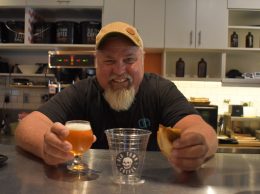Main street merchants hoping for holiday miracle to save sales

During what should be their busiest season, tri-county businesses are trying to recapture foot traffic driven away by the Thomas fire.
Facing a revenue meltdown as the Thomas fire drags into a second week, business owners put out a call for residents to do their shopping locally and made tough calls on ways to support staff.
“Our regular business levels are at less than 5 percent of normal,” said Sherry Villanueva, owner of Santa Barbara-based Acme Hospitality, which includes The Lark, Lucky Penny, Loquita and other food and beverage businesses. “It’s had a huge impact.”
As the fire approached, Villanueva said she connected with Goleta nonprofit Direct Relief to secure masks for her staff, but numerous evacuations and air quality warnings still forced her to close her business for two full days.
“The challenge of that is that many of our employees depend on the work and can’t afford for us to be closed,” she said. “We’ve been open, but it’s a very expensive thing for us. We’ve been losing lots and lots of money because business levels are so low. It was a conscious decision.”
While many hotels offered discounts to evacuees or first responders, event and booking cancellations began to stretch into January, sources said. The Four Seasons Resort The Biltmore Santa Barbara suspended all of its operations indefinitely.
Chambers of commerce in Carpinteria, Ventura and Santa Barbara all encouraged residents and visitors to buy local leading into the holidays, and support programs began to mobilize across both counties for affected businesses.
In partnership with the chambers, the Small Business Development Center for Santa Barbara and Ventura counties organized a team of advisors to offer consultations, and the Workforce Development Board worked to find state assistance.
The Ventura Visitors and Convention Bureau organized a toolkit for businesses to let customers know their doors were still open, including posters reading “Ventura thanks you for being here” and other social media marketing tools. The Ventura chamber also highlighted gift card sales for holiday gifts or as donations to those impacted in the fires.
Retail employees number 39,000 in Ventura County alone, and the sector accounts for 6 percent of the total regional economy, according to information released by the Economic Development Collaborative-Ventura County. The Ojai Valley in particular lost nearly a third of its business as the leisure and hospitality sector ground to a halt.
“If ever there was a year that we need the whole community to be supporting local businesses, it’s now,” Villanueva said. “Small businesses tend to operate somewhat on the edge, and a disaster like this can really have long-term, devastating effects.”
The company also wanted to offer a place for customers to eat, drink and connect with one another, she said, as long as it stayed safe to do so.
Safety was the top priority for nonprofit organization Central Coast Alliance United for a Sustainable Economy, or CAUSE.
“As the fire moved on, we really felt like the immigrant community, the farmworker community and our Spanish speaking families were really being left behind,” said Policy and Communications Director Lucas Zucker.
The organization jumped into action to provide masks for farmworkers working eight-hour shifts in the smoky conditions. It also connected with state legislators to reopen the regional office of the Division of Occupational Safety and Health and provide emergency updates for Spanish speakers.
“We had really bad air quality and really bad water quality, and a lot of folks really weren’t getting that information,” he said. “Even if the conditions seem okay, you need to have those masks and be ready for air conditions to change in a second.”
The organization distributed around 4,000 masks for workers, but that is still only a fraction of those who need them, from Oxnard through North Santa Barbara County.
“The truth is that workers are in a tough situation,” Zucker said. “It’s the slow season in agriculture, and a lot of them are depending on the income to keep a roof over their heads and can’t afford the unpaid time off.”
In response, the organization helped coordinate messaging with ag industry leaders, including the Ventura County Agriculture Association, the Farm Bureau and Driscoll’s, among others.
With no end in sight, he added that “the cumulative effects are very real, especially for people spending way more time outdoors in agriculture and doing heavy activity.”
• To tell us your story, contact Marissa Nall at mnall@pacbiztimes.com.












